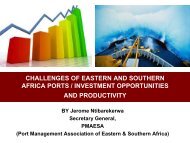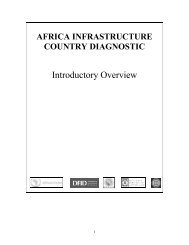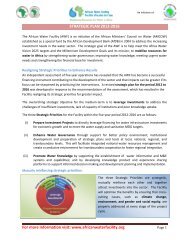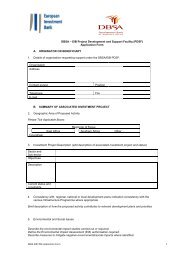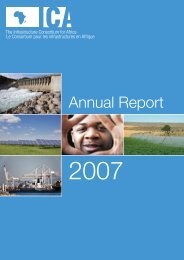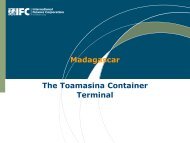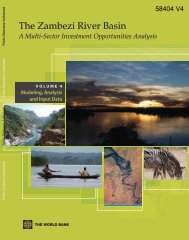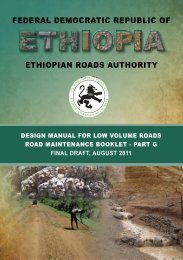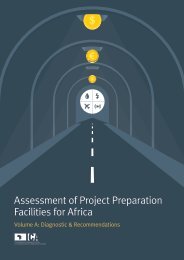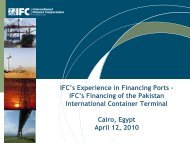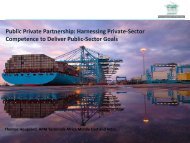IFC Public Private Partnerships Seminar: Airports - ppiaf
IFC Public Private Partnerships Seminar: Airports - ppiaf
IFC Public Private Partnerships Seminar: Airports - ppiaf
You also want an ePaper? Increase the reach of your titles
YUMPU automatically turns print PDFs into web optimized ePapers that Google loves.
<strong>IFC</strong> <strong>Public</strong> <strong>Private</strong> <strong>Partnerships</strong> <strong>Seminar</strong>:<br />
<strong>Airports</strong><br />
Overview, assessment and recommendations for<br />
improvement<br />
February 22-23, 2011
May 22, 2011<br />
Dear Sir/Madam:<br />
During February 22–23 2011, <strong>IFC</strong> hosted an educational seminar on <strong>Public</strong>-<strong>Private</strong><br />
<strong>Partnerships</strong> (PPPs) in the Airport sector in Dubai. The event was made possible with the<br />
support of <strong>Public</strong>-<strong>Private</strong> Infrastructure Advisory Facility (―PPIAF‖), the Infrastructure<br />
Development Collaboration Partnership Fund (―DevCo‖), the Islamic Development Bank (―IDB‖)<br />
and the Infrastructure Consortium for Africa (―ICA‖). I am happy to enclose a report on the<br />
proceedings of this seminar.<br />
As part of the <strong>IFC</strong>'s PPP <strong>Seminar</strong> Series which aims to disseminate knowledge on involving the<br />
private sector in the delivery of public infrastructure, <strong>IFC</strong> organized this conference as a forum<br />
for discussion and debate, bringing together the public and private sector from various<br />
continents, and covering a wide range of themes of interest to a range of airport sector<br />
stakeholders. This was an ideal opportunity for bringing to the forefront key issues which are<br />
encountered on a regular basis when operating in the airport sector, and for developing new<br />
ideas / solutions for future PPP's in this sector.<br />
It is clear that the <strong>Airports</strong> Sector has gained substantially from private sector investment. The<br />
sector is attractive to investors due to its inherent stability of point-to-point traffic and the<br />
opportunity for multiple revenue streams. The public sector too has gained significantly from the<br />
private sector investment in the airports from revenue sharing, concession fees, and upgrade of<br />
previously neglected infrastructure. The main beneficiaries, of course, have been the<br />
passengers who enjoy better passenger experiences from the improved airports: open and<br />
better shopping areas, easy access to check-in and baggage facilities, improved lighting, etc.<br />
The regulatory challenges and limited capacity in the public sector to supervise the private<br />
operators, however, remain significant. In many cases the ―rules of the game‖ were changed<br />
after the award of the concession contracts, which discourage investment in the sector. For<br />
some of the lesser developed countries, safety issues also remain a big challenge which can<br />
stymie further growth of this sector, particularly at the time of significant capacity constraints<br />
faced by the sector.<br />
D.I.F.C. – The Gate, West 10 th Floor, P.O. Box 118071, Dubai, United Arab Emirates<br />
Tel: +971-4-360 1000, Fax: +971-4-360 1010, Email: mmekan@ifc.org
This seminar is a natural continuation in a long line of learning events that <strong>IFC</strong> has hosted with<br />
the aim of providing public and private investor insight along with knowledge sharing around<br />
PPPs. These seminars are designed to help increase the capacity within the public sector and<br />
act as a catalyst for greater private sector involvement in infrastructure as a tool to mitigate ongoing<br />
infrastructure deficits through PPPs or similar mechanisms. With a focus on case studies<br />
from different parts of the world, these seminars provide a forum for the public and private<br />
sector to interact and share experiences and lessons. Academic speakers as well as<br />
development professionals, experienced government officials and private sector investors offer<br />
their perspectives and experiences and help create an environment where multiple perspectives<br />
can be considered.<br />
Sincerely,<br />
Moazzam A. Mekan<br />
Manager<br />
Infrastructure Advisory Services<br />
3 | P a g e
Table of Contents<br />
1. Introduction .......................................................................................................................... 5<br />
2. Agenda ................................................................................................................................ 6<br />
3. List of Attendees .................................................................................................................. 9<br />
4. <strong>Seminar</strong> Evaluation ............................................................................................................ 12<br />
5. Recommendations for Future <strong>Seminar</strong>s ............................................................................. 19<br />
6. Appendix A: Participant Feedback Comments ................................................................... 22<br />
7. Appendix B: Speaker Presentations ................................................................................... 24<br />
4 | P a g e
1. Introduction<br />
The International Finance Corporation (―<strong>IFC</strong>‖), a member of the World Bank Group, has been<br />
developing a series of systematic learning events on <strong>Public</strong>-<strong>Private</strong> <strong>Partnerships</strong> (―PPP‖s).<br />
These learning events aim to help government officials develop an understanding of PPPs and<br />
the institutional capacity-building which PPPs require, and to encourage them to implement their<br />
own successful PPP programs in their respective countries. The series of seminars/workshops<br />
focuses on the fundamentals of PPPs and case studies from different parts of the world in the<br />
context of sectoral themes.<br />
<strong>IFC</strong> organizes 2-3 learning events per year in partnership with other donor agencies. The first of<br />
such seminars was a one-day event held in Dubai on April 13 th , 2009, with a focus on the MENA<br />
and South Asia regions and the roads sectors. The second of such seminars was a two-day<br />
event held in Dubai on November 4-5 2009, with a focus on the water, wastewater, and<br />
desalination sectors. A port <strong>Seminar</strong> was organized in April 2010 in Cairo. On February 22-23,<br />
2011, a two-day event was held in Dubai with a focus on the airport sector. The event was<br />
organized in collaboration with the <strong>Public</strong>-<strong>Private</strong> Infrastructure Advisory Facility (―PPIAF‖), the<br />
Infrastructure Development Collaboration Partnership Fund (―DevCo‖), the Islamic Development<br />
Bank (―IDB‖) and the Infrastructure Consortium for Africa (―ICA‖). Each of these facilities and<br />
institutions is an important partner for <strong>IFC</strong>.<br />
PPIAF, the multi-donor technical assistance facility, was created in 1999 to act as a catalyst to<br />
increase private sector participation in emerging markets. It provides technical assistance to<br />
governments to support the creation of a sound enabling environment for the provision of basic<br />
infrastructure services by the private sector. PPIAF is financed by 16 multilateral and bilateral<br />
donors. Its funds are untied and grants are provided on a demand-driven basis. 1<br />
DevCo is a multi-donor facility that helps the world’s poorest countries improve basic public<br />
infrastructure services. DevCo was established by <strong>IFC</strong> and the United Kingdom’s Department<br />
for International Development (―DFID‖) to support <strong>IFC</strong>’s work to increase private sector<br />
participation in infrastructure. Since its inception in October 2004, DevCo has worked hand-inhand<br />
with <strong>IFC</strong> to support 17 successful projects. 2<br />
IDB, a multilateral development financing institution established in 1975, fosters the economic<br />
development and social progress of its 56 member countries and Muslim communities<br />
individually as well as jointly in accordance with the principles of Islamic Law. IDB participates<br />
in equity capital and grant loans and also provides financial assistance to member countries in<br />
other forms (such as through trust funds) for economic and social development. 3<br />
The ICA, launched in 2005, is not a financing agency, but acts as a platform to catalyze donor<br />
and private sector financing of African infrastructure projects in order to improve the lives and<br />
economic well being of Africa’s people. ICA also works to help remove some of the technical<br />
and policy challenges and barriers to building more infrastructure. ICA members include the G8<br />
countries, the World Bank Group, and the African Development Bank Group. 4<br />
The objective of the two-day airport sector seminar was to raise awareness and educate<br />
selected public-sector participants from a number of countries around the world about different<br />
ways of involving the private sector in airport infrastructure development. The seminar was also<br />
1 Source: http://www.<strong>ppiaf</strong>.org/<strong>ppiaf</strong>/<br />
2 Source: http://www.ifc.org/ifcext/psa.nsf/content/Devco<br />
3 Source: http://www.isdb.org/irj/portal/anonymous<br />
4 Source: http://www.icafrica.org/en/about-ica/<br />
5 | P a g e
intended to provide a forum for the participants to discuss issues regarding the implementation<br />
of PPPs, to share success stories, and to learn from lessons of previous experiences. PPP<br />
experiences from different parts of the world were covered in the context of presentations and<br />
panel and roundtable discussions.<br />
The target audiences for this seminar were government officials from various countries around<br />
the world, particularly those who might be at the inception of their PPP programs. The seminar<br />
participants included countries as diverse as Brazil, Burkina Faso, Cameroon, Jordan, Lebanon,<br />
Maldives and Morocco. The seminar focused on countries that have expressed to <strong>IFC</strong> an<br />
interest in airport PPPs; therefore, only these ―candidates‖ for PPPs were invited.<br />
The present report is intended for dissemination to sponsors / partners and <strong>IFC</strong> to address:<br />
o<br />
o<br />
o<br />
o<br />
Proceedings of the seminar, including the discussions between the participants and<br />
speakers;<br />
Feedback from the attendees;<br />
Impact that was achieved, in terms of participants’ learning; and<br />
Suggestions on how to improve similar seminars in the future.<br />
The report is structured as follows:<br />
Following a brief overview of the seminar agenda and attendees list is a review of the feedback<br />
made by participants regarding how the seminar was structured and conducted to achieve its<br />
learning objectives. The report concludes with recommendations on how future seminars could<br />
be improved to further enhance participant learning. Speaker presentations have been provided<br />
to all via an FTP site, along with pictures of the event.<br />
2. Agenda<br />
The seminar was held over two days from February 22 - 23, 2011 at the Sofitel Jumeirah Beach<br />
in Dubai, UAE. The tables below summarize the days’ proceedings:<br />
Feb. 22 2011<br />
8:30-8:45 Welcome Address<br />
<strong>IFC</strong><br />
Airport Sector & PPPs<br />
8:45-9:00 Airport Industry: Global and Regional Trends<br />
Mr. Andreas Schimm, Airport Council International<br />
9:00-9:30 Increasing Trends Toward PPPs in Emerging Markets<br />
Mr. Marc Juhel, World Bank; Ms. Ramatou Magagi, <strong>IFC</strong><br />
9:30-10:00 Perspectives and Challenges for the Airport Sector<br />
Mr. Guy Brazeau, International Air Transport Association<br />
6 | P a g e
10:00-10:45 Questions & Answers<br />
10:45-11:10 Coffee Break<br />
PPPs & Structuring<br />
11:10-11:30<br />
11:30-11:50<br />
How to Structure an Optimal PPP<br />
Mr. Moazzam Mekan, <strong>IFC</strong><br />
Key Technical & Commercial Aspects in Designing a New<br />
Airport<br />
Mr. Rajeev K. Jain, GVK<br />
11:50-13:05<br />
What Governments Look for in PPPs: Perspective of One<br />
Country From a Region<br />
Asia – Government of Maldives<br />
Middle East and North Africa – Government of Syria<br />
Africa — Government of Uganda<br />
Latin America — Government of Paraguay<br />
Europe — Government of Crimea<br />
13:05-14:15<br />
14:15-14:45<br />
14:45-15:30<br />
15:30-15:45<br />
Lunch<br />
Hub <strong>Airports</strong> and Packaged <strong>Airports</strong>: What Does It Take? –<br />
Feasibility and Attractiveness<br />
Mr. Jacques Follain, ADP; Mr. Rajeev K. Jain, GVK; Mr. Andreas<br />
Schimm, ACI<br />
Questions & Answers<br />
Coffee Break<br />
15:45-16:05 Tourism-driven <strong>Airports</strong>: Specificities and Structuring<br />
Mr. A. Nithyanand, GMR<br />
16:05-16:45 Roundtables of Regional PPP Showcase: Investors – Operators<br />
Mr. Jacques Follain, ADP; Mr. Sidharath Kapur, GMR; Mr. Eric<br />
Fleurrison, Bouygues; Mr. Jacques Khoriaty, Egis Avia<br />
16:45-19:00<br />
19:00<br />
Free Time<br />
Dinner<br />
7 | P a g e
Feb. 23 2011<br />
8:30-8:45 Welcome Address<br />
<strong>IFC</strong><br />
Regulation<br />
8:45-9:05 Key Legal Considerations in Airport PPPs<br />
Mr. John Crothers, Gide Loyrette Nouel<br />
9:05-9:35 Regulation: Future and Impacts on PPPs<br />
9:35-10:05 Questions & Answers<br />
Mr. Guy Brazeau, IATA; Mr. Rafael Scherre, ANAC, Brazil; Mr.<br />
Cleverson da Silva, Ministry of Finance, Brazil; TAV, Turkey<br />
Financing<br />
10:05-10:25 Key Aspects of Airport PPP Financing<br />
Mr. Gherardo Baruffa, Credit Agricole<br />
10:25-10:45<br />
10:45-11:05<br />
11:05-11:25<br />
11:25-11:55<br />
11:55-12:45<br />
12:45-14:00<br />
Financing Airport PPP Project: Case Study from <strong>IFC</strong><br />
Mr. Said Amlaiky, <strong>IFC</strong><br />
Coffee Break<br />
How Islamic Banking can Contribute to PPPs<br />
Mr. Mansur Noibi, Islamic Development Bank<br />
PPP Finance: Banks and Multilaterals Perspective<br />
Mr. Michael Cooper, HSBC; Mr. Mohamed Hassan, ADB; Stephen<br />
O’Driscoll, EIB; Mr. Richard Wyness, <strong>IFC</strong><br />
Questions & Answers<br />
Lunch<br />
Environment<br />
14:00-14:20<br />
Green <strong>Airports</strong> and Trends<br />
Prof. David Raper, Center for Air Transport and the Environment<br />
14:20-14:50 The Future of Eco-friendly <strong>Airports</strong> and Impacts on PPPs<br />
Mr. Richard Wyness, <strong>IFC</strong>; Mr. Ali Shiyam, Government of Maldives<br />
8 | P a g e
14:50-15:30<br />
15:30-15:50<br />
Questions & Answers<br />
Coffee Break<br />
Security & Safety<br />
15:50-16:10<br />
16:10-16:40<br />
16:40-17:05<br />
17:05-17:15<br />
17:15-18:00<br />
Global Challenges and Measures to Consider in Airport PPPs<br />
(Including Air Navigation Safety)<br />
Dr. Charles Schlumberger, World Bank<br />
Outlook on Security and Safety and How Can PPPs Assist?<br />
Mr. Hamdi Chaouk, Director General of Civil Aviation - Lebanon; Mr.<br />
Proper Tesha, Director of Tanzania Airport Authority<br />
Questions & Answers<br />
Final Remarks<br />
<strong>IFC</strong>-WB Managers<br />
<strong>Public</strong> Sector Wrap-Up Discussion Session: Latin America; Africa;<br />
Middle East and North Africa; Asia<br />
3. List of Attendees<br />
The table below summarizes the list of speakers and enlisted attendees that participated in the<br />
seminar:<br />
Name Organization Country<br />
A. Nithyanand GMR India<br />
Abdullah Kombo Ministry of Infrastructure Zanzibar<br />
Alex Leigh <strong>IFC</strong> UAE<br />
Ali Shiyam President’s Office Maldives<br />
Andreas Schimm ACI Switzerland<br />
Asem Helmi Civil Aviation (GACA) Saudi Arabia<br />
Asteria Mushi Tanzania <strong>Airports</strong> Authority Tanzania<br />
Azmi Nalshik Civil Aviation Jordan<br />
9 | P a g e
Name Organization Country<br />
Callum Thomas CATE UK<br />
Carrie Farley <strong>IFC</strong> UAE<br />
Charles Schlumberger World Bank USA<br />
Cleverson Da Silva AEP/DEPEP1 Brazil<br />
David Miles <strong>Airports</strong> Vanuatu Ltd Vanuatu<br />
David Raper CATE UK<br />
Doreen Owusu-Fianko Ghana <strong>Airports</strong> Company Ltd Ghana<br />
Eric Fleurrison Bouygues France<br />
Ernest Nnanga<br />
Chef Cellule de Preparation des Cameroon<br />
Grands Projets<br />
Fathimath Niuma President’s Office Maldives<br />
Feras Mohammed Civil Aviation Syria<br />
Francis Sey Ghana <strong>Airports</strong> Company Ghana<br />
Gherardo Baruffa Credit Agricole France<br />
Guy Brazeau IATA Canada<br />
Hamad Massoud Hamad Ministry of Transport Zanzibar<br />
Hamdi Chaouk Civil Aviation Lebanon<br />
Hannington Banyendera Strategic Planning Uganda<br />
Hendry Joewangeh <strong>Airports</strong> Vanuatu Limited Vanuatu<br />
Igor Sukhorukov Prime Minister’s Office Ukraine - Crimea<br />
Indranil Sarkar <strong>IFC</strong> Bangladesh<br />
Jacques Follain Aéroports de Paris France<br />
Jacques Khoriaty Egis France<br />
Jean-Pierre Barral Proparco France<br />
John Crothers Gide France<br />
Julio Benitez<br />
Ministry of <strong>Public</strong> Works and Paraguay<br />
Communications<br />
M. Khalid Cherkaoui Strategic Studies Dept Morocco<br />
Maisaa Wehbeh Civil Aviation Syria<br />
Mansur Noibi Islamic Development Bank Saudi Arabia<br />
10 | P a g e
Name Organization Country<br />
Marc Juhel World Bank USA<br />
Marokon Alilee <strong>Airports</strong> Vanuatu Ltd. Vanuatu<br />
Martin Bemelingue Cameroon Airport Authority Cameroon<br />
Mauricio Costa Ministry of Planning Brazil<br />
Maya Chamli Higher Council for Privatization Lebanon<br />
Mcdavids Torgbor Torto Ghana <strong>Airports</strong> Co. Lts. Ghana<br />
Michael Cooper HSBC UAE<br />
Moazzam Mekan <strong>IFC</strong> UAE<br />
Mohamed Amar Kamal Eddin Civil Aviation Syria<br />
Mohamed Hassan ICA Tunisia<br />
Mohammed Al Kohlani Civil Aviation Yemen<br />
Muneer Ferozie <strong>IFC</strong> UAE<br />
Najeeb J. Moharram Civil Aviation Yemen<br />
Omar Chambo Ministry of Transport Tanzania<br />
Omar Mansour Civil Aviation Syria<br />
Omar Mzee Ministry of Finance Zanzibar<br />
Pascal Kowu Komla Aéroports du Togo Togo<br />
Patrice Bouedo EGIS France<br />
Philippe Kennedy Ketafio Ministry of Transports Central African Republic<br />
Prosper Tesha Tanzania <strong>Airports</strong> Authority Tanzania<br />
Rafael Scherre ANAC Brazil<br />
Rajeev K. Jain GVK India<br />
Ramatou Magagi <strong>IFC</strong> USA<br />
Richard Wyness <strong>IFC</strong> UAE<br />
Roland Dakissaga MOAD Burkina Faso<br />
Rozenn Cornec ICQP UAE<br />
Ruben Ocampo<br />
Ministry of <strong>Public</strong> Works and<br />
Communications<br />
Paraguay<br />
11 | P a g e
Name Organization Country<br />
Said Amlaiky <strong>IFC</strong> UAE<br />
Sanjay Puri <strong>IFC</strong> UAE<br />
Sara Sulaiman <strong>IFC</strong> UAE<br />
Serhii Vasiutin Supervisory Board of JSC Ukraine - Crimea<br />
Shadi Al-Sabbah Civil Aviation (GACA) Saudi Arabia<br />
Shamik Desai <strong>IFC</strong> USA<br />
Sidharath Kapur GMR India<br />
Stephan Diefenthal DEG Germany<br />
Stephen O’Driscoll EIB Luxemburg<br />
Tarek Dandashli Higher Council for Privatization Lebanon<br />
Wada Momoko ICA Tunisia<br />
Waleed Saraf <strong>IFC</strong> UAE<br />
Yusra Baloch <strong>IFC</strong> UAE<br />
Zeeshan Sheikh <strong>IFC</strong> UAE<br />
4. <strong>Seminar</strong> Evaluation<br />
At the end of each day of the seminar, all attendees were given a feedback form to complete in<br />
which they were asked to rate from 1 (Disagree/Not Helpful) to 5 (Agree/Helpful) various<br />
aspects of the seminar. Attendees were also given space to provide additional comments<br />
(please refer to Appendix A for a verbatim transcript of the additional comments). As some<br />
forms were not fully completed, the summary below shows the percentage of responses per<br />
category so as not to skew results. The cells have subsequently been highlighted to draw<br />
attention to the highest and lowest concentration of scores, ranging from green (highest), yellow<br />
(second), orange (third), and red (least).<br />
For the purpose of interpretation, scores will be interpreted as:<br />
General Topics:<br />
- 1: Disagree<br />
- 2: Slightly Disagree<br />
- 3: Do not disagree or agree<br />
- 4: Agree<br />
- 5: Strongly Agree<br />
Panel/Lecture Assessment:<br />
- 1: Not Helpful<br />
- 2: Slightly Helpful<br />
12 | P a g e
- 3: Helpful<br />
- 4: Very Helpful<br />
- 5: Extremely Helpful<br />
Overall, the general feedback to the seminar was very positive, with most responses centering<br />
around 4 and 5. The overwhelming majority of participants were in agreement that the seminar<br />
was well conducted, and found the seminar to be very or extremely helpful. However, there was<br />
a consistent minority of attendees that felt the different elements of the seminar were only<br />
moderately helpful. Evaluation of the scores is analyzed in further detail below, in light of the<br />
additional comments provided by participants.<br />
General Topics<br />
Topics were well<br />
selected<br />
Event duration was<br />
suitable<br />
Speakers had good<br />
knowledge of the<br />
topics<br />
Speakers explained<br />
clearly<br />
Mix of public and<br />
private sector<br />
speakers was<br />
appropriate<br />
Right amount of time<br />
for Q&A<br />
I will be able to use<br />
and apply what I<br />
learned<br />
Number of<br />
Responses<br />
Disagree Strongly Agree<br />
1 2 3 4 5<br />
37 0% 3% 11% 30% 57%<br />
38 3% 3% 18% 37% 39%<br />
39 0% 0% 0% 56% 44%<br />
39 0% 0% 15% 62% 23%<br />
37 0% 0% 11% 59% 30%<br />
36 3% 0% 0% 53% 44%<br />
38 0% 3% 5% 55% 37%<br />
- Topics were well selected: 57% of respondents strongly agreed (giving a score of ―5‖) and<br />
30% agreed (giving a ―4‖). 11% were neutral (scoring a ―3‖) and the remaining 3% slightly<br />
disagreed (indicating a ―2‖). The majority of participants were very happy with the range of<br />
topics covered, from in-depth discussion of broad-based holistic trends to technical practical<br />
implementation issues.<br />
- Event duration was suitable: This question raised one of the most varied of responses,<br />
ranging from 3% of attendees disagreeing with the choice of length (indicating a ―1‖), 3%<br />
disagreeing slightly (giving a score of ―2‖), 18% being indifferent (scoring a ―3‖), 37%<br />
agreeing (scoring a ―4‖) and 39% agreeing strongly (indicating a ―5‖). Some attendees felt<br />
that having the seminar in two days was too condensed. However, the event duration was<br />
an improvement over the previous seminars in the series, which were either one day or oneand-a-half<br />
days. In addition, it should be noted that prior to the event, <strong>IFC</strong> consulted various<br />
parties (Donors, participants, speakers) and the consensus was that 2 days was the ideal<br />
length for the seminar: parties consulted all believed that extending the event beyond 2 days<br />
will not add much and could potentially have the negative impacts of fatigue from<br />
participants, conflicts for their other commitments, lack of availability for an entire week (the<br />
13 | P a g e
3 days of the event plus 2 more days for travel). Following this feedback, it was agreed to<br />
keep the Airport seminar no longer than 2 full days.<br />
- Speakers had good knowledge of the topics: This question provided the most unanimous<br />
positive response, with 56% agreeing (responding with a ―4‖) and 44% agreeing strongly<br />
(indicating a ―5‖). The speakers selected were all clearly experts in their field, and this was<br />
evidenced in their presentations.<br />
- Speakers explained clearly: Overall speakers appeared to explain clearly, with 62%<br />
agreeing (scoring a ―4‖). 23% agreed strongly (scoring a ―5‖) and 15% were neutral<br />
(indicating a ―3‖).<br />
- Mix of public and private sector speakers was appropriate: It was clear from the<br />
speakers selected that the objective of the organizers was to provide a wide range of<br />
viewpoints and experiences. Respondents largely agreed, with 59% scoring a ―4‖ and 30%<br />
scoring a ―5‖. The remaining 11% were neutral (scoring a ―3‖). Based on feedback from<br />
previous seminars, and in order to also hear more on the public sector side of the story, <strong>IFC</strong><br />
decided to involve government / public sector officials further by adding their representatives<br />
to panels and giving them more slots as speakers (example: the series of 15-minute<br />
presentations whereby one country per region discussed their views on airport PPPs). At the<br />
end of the event, <strong>IFC</strong> also offered another opportunity for Government officials to voice their<br />
opinions during the public sector wrap up sessions. Eventually, the audience cut short the<br />
session as they didn’t have further questions.<br />
- Right amount of time for Q&A: The timing of the presentations was very tightly controlled<br />
to ensure, among other things, that there was plenty of time for Q&A. Almost all of the<br />
respondents agreed. 53% indicated a ―4‖ and 44% a ―5‖. 3% strongly disagreed (indicating<br />
a ―1‖). This was an improvement from previous seminars for which <strong>IFC</strong> received feedback<br />
on time-keeping. In addition, given previous comments from participants of past <strong>IFC</strong> events,<br />
this seminar included Q&A sessions for every sub-topic and the average timing of Q&A was<br />
45 minutes (on top of panel discussions).<br />
- I will be able to apply what I learned to my work: The majority of responses were a rating<br />
of ―4‖ (55%) and 37% gave a rating of ―5‖, indicating that most attendees agreed that the<br />
material very helpful and relevant to their daily work. However, 5% of attendees gave a<br />
rating of ―3‖ and 3% gave a rating of ‖2‖. Hence, a small minority felt that the learning<br />
component of the seminars might have been even more applicable to their daily work.<br />
Panel/Lecture Assessment<br />
To what extent did the panels help<br />
you understand the PPP process<br />
and airport sector development?<br />
Airport Industry: Global and<br />
Regional Trends<br />
Increasing Trends Toward PPP’s<br />
in Emerging Markets<br />
Perspectives and Challenges for<br />
the Airport Sector<br />
Number of<br />
Responses<br />
Not Helpful Extremely<br />
Helpful<br />
1 2 3 4 5<br />
17 0% 0% 6% 59% 35%<br />
37 0% 0% 14% 59% 27%<br />
37 0% 5% 8% 59% 27%<br />
36 0% 0% 11% 53% 36%<br />
How to Structure an Optimal PPP 37 0% 0% 8% 49% 43%<br />
14 | P a g e
Key Technical and Commercial<br />
Aspects in Designing New Airport<br />
What Govs Look For in PPPs -<br />
Maldives<br />
What Govs Look For in PPPs -<br />
Syria<br />
What Govs Look For in PPPs -<br />
Uganda<br />
What Govs Look For in PPPs -<br />
Paraguay<br />
What Govs Look For in PPPs -<br />
Crimea<br />
Hub <strong>Airports</strong> and Packaged<br />
<strong>Airports</strong><br />
Tourism-driven <strong>Airports</strong>:<br />
Specificities & Structuring<br />
Roundtables of Regional PPP<br />
Showcase: Investors - Operators<br />
Key Legal Considerations in<br />
Airport PPPs<br />
Regulation: Future and Impacts<br />
on PPPs<br />
Key Aspects of Airport PPP<br />
Financing<br />
Financing Airport PPP Project:<br />
Case Study from <strong>IFC</strong><br />
How Islamic Banking can<br />
Contribute to PPPs<br />
PPP Finance: Banks and<br />
Multilaterals Perspective<br />
34 0% 0% 15% 62% 22%<br />
36 0% 0% 11% 56% 33%<br />
35 3% 3% 17% 66% 11%<br />
36 3% 3% 22% 61% 11%<br />
36 3% 0% 14% 67% 17%<br />
36 0% 3% 25% 61% 11%<br />
36 0% 0% 17% 56% 28%<br />
35 0% 0% 9% 40% 51%<br />
36 0% 0% 11% 47% 42%<br />
27 0% 0% 4% 67% 30%<br />
28 0% 4% 7% 61% 29%<br />
30 0% 3% 13% 50% 33%<br />
32 0% 0% 16% 53% 31%<br />
30 0% 3% 17% 50% 30%<br />
31 0% 3% 23% 45% 29%<br />
Green <strong>Airports</strong> and Trends 28 4% 4% 14% 50% 29%<br />
Future of Eco-friendly <strong>Airports</strong> and<br />
Impacts on PPPs<br />
Global Challenges and Measures<br />
to Consider in Airport PPPs<br />
Outlook on Security & Safety and<br />
How Can PPPs Assist?<br />
30 3% 3% 27% 47% 20%<br />
30 0% 0% 3% 33% 63%<br />
19 0% 0% 0% 53% 47%<br />
Final Remarks 16 0% 0% 0% 50% 50%<br />
- To what extent did these panels help you understand the PPP process & airport<br />
sector development? The overwhelming majority of participants felt that the panels<br />
significantly helped them understand the PPP process and sector development (35% scored<br />
a ―5‖ and 59% scored a ―4‖, with only 6% scoring a ―3‖). This shows that in general, the<br />
format of having panel discussions centered on different topics was well received.<br />
- Airport Industry: Global and Regional Trends: This presentation provided an overview<br />
of the historical trends in worldwide passenger traffic and in regional passenger traffic and a<br />
forecast of expected future trends. Most participants found this presentation to be very<br />
helpful. The presentation, which highlighted the macroscopic trends and developments in<br />
15 | P a g e
the airport sector, provided a good opening to the seminar. 27% of respondents scored a<br />
―5‖ and 59% a ―4‖. 14% scored a ―3‖.<br />
- Increasing Trends Toward PPPs in Emerging Markets: This set of presentations<br />
focused on the dominant emergent trends in PPPs, highlighting why airport PPPs are<br />
growing, outlining regional developments and the PPP trends in various regions, and<br />
providing an outlook for private investment in the industry. On balance, this presentation<br />
was well received, with the majority of respondents scoring either a ―4‖ (59%) or a ―5‖ (27%).<br />
A minority of attendees did not find the lecture quite as helpful—8% scored a ―3‖ and 5% a<br />
―2‖.<br />
- Perspectives and Challenges for Airport Sector: This presentation focused on air<br />
transport traffic trends, and how these trends affect the outlook for the industry amongst the<br />
various regions. On balance, this panel was well received, with the majority of respondents<br />
scoring either a ―4‖ (53%) or a ―5‖ (36%). A minority of attendees found it fairly helpful,<br />
scoring a ―3‖ (11%).<br />
- How to Structure an Optimal PPP: This presentation walked the participants through an<br />
overview of <strong>IFC</strong>’s approach and role as lead advisor on PPP projects and then focused on<br />
<strong>IFC</strong>’s involvement in a host of particular airport projects. Most participants found this<br />
presentation to be very helpful, with the majority of respondents scoring either a ―4‖ (49%) or<br />
a ―5‖ (43%). The remaining 8% of attendees found it fairly helpful, scoring a ―3‖.<br />
- Key Technical and Commercial Aspects in Designing a New Airport: This presentation<br />
began with an overview of the key technical aspects related to designing an airport and then<br />
provided an overview of the commercial considerations, including, among other things, the<br />
transition in the airport operating model toward non-aeronautical (retail) services and the key<br />
drivers to airport retailing, The vast majority of respondents thought this presentation was<br />
very helpful (62% scored a ―4‖). 15% found it helpful (scoring a ―3‖) and 22% extremely<br />
helpful (scoring a ―5‖).<br />
- What Govs Look for in PPPs – Maldives: The Representative fo the Government of<br />
Maldives presented the recent concession of Malé airport, advised by <strong>IFC</strong> Advisory and<br />
provided GoM’s perspectives, expectations as well as the development impact of the deal<br />
for the country. Most respondents enjoyed this presentation and found it to be very helpful<br />
(56% scored a ―3‖). 33% found it extremely helpful (scoring a ―5‖) and 11% found it helpful<br />
(scoring a ―3‖).<br />
- What Govs Look for in PPPs – Syria: The Representative of the Government of Syria<br />
presented his government’s views on PPPs for Syria as well as the reasons why they could<br />
consider expanding such private sector initiatives for a number of sectors, including the<br />
airport. The majority of respondents found this presentation to be very helpful (66% scored a<br />
―4‖). 11% found it extremely helpful (indicating a ―4‖) and 17% found it helpful (indicating a<br />
―3‖). A handful of participants found it less helpful (3% indicated a ―2‖ and 3% a ―1‖).<br />
- What Govs Look for in PPPs – Uganda: The Representative of the Government of<br />
Uganda presented the program of GoU with regard to PPPs in a country that had been<br />
doing PPPs for a long time: most productive sector companies have already been handed to<br />
private sector and the overall results were satisfactory. GoU now wants to continue with<br />
PPPs for the airport sector that require both substantial investment and expert management<br />
practice to accommodate the increasing traffic growth. The majority of respondents found<br />
this presentation to be very helpful or extremely helpful (61% scored a ―4‖ and 11% a ―5‖).<br />
16 | P a g e
However, 22% indicated a score of ―3‖, 3% a score of ―2‖ and 3% a score of ―1‖. Hence, a<br />
minority of respondents did not find the presentation to be very helpful.<br />
- What Govs Look for in PPPs – Paraguay: Government of Paraguay is opening up to<br />
PPPs and GoP had already recruited <strong>IFC</strong> as their Lead Advisor for the PPP of Asuncion<br />
Airport. The Government’s representative presented his country’s goals and expectations<br />
with regard to this important airport project. The overwhelming majority of respondents<br />
found this presentation to be very helpful (67% scored a ―4‖). 17% found the presentation to<br />
be extremely helpful (scoring a ―5‖) and 14% found it to be helpful (scoring a ―3‖). 3% of<br />
respondents did not find it helpful (scoring a ―1‖).<br />
- What Govs Look for in PPPs – Crimea: Crimea is witnessing remarkable traffic growth<br />
and the Government is turning to the private sector for a PPP for Simferopol Airport. The<br />
Government’s Representative presented the airport project and invited private operator to<br />
explore the opportunity of doing business in Crimea. The majority of respondents found this<br />
presentation to be very helpful (61% scored a ―4‖). 11% found it extremely helpful (scoring a<br />
―5‖). However, a minority of respondents found it not as helpful (25% indicated a score of<br />
―3‖ and 3% a score of ―2‖).<br />
- Hub <strong>Airports</strong> and Packaged <strong>Airports</strong>: This presentation began with an overview of PPP<br />
projects in India and the future potential of PPP in Indian airports and then focused on<br />
prerequisites and key success factors in hub development, Most participants found this<br />
panel very helpful or extremely helpful. (56% of respondents scored a ―4‖, 28% a ―5‖.) 17%<br />
of respondents found it helpful (indicating a score of ―3‖).<br />
- Tourism-driven <strong>Airports</strong> – Specificities & Structuring: This presentation covered the<br />
traits of tourism-driven airports and focused on how the specific characteristics of such<br />
airports impact their PPP structure and financing. The presentation also provided an<br />
overview of the Maldives Airport PPP, which <strong>IFC</strong> advised on. The majority of respondents<br />
enjoyed this presentation and found it extremely helpful. 51% scored a ―5‖. 40% found it<br />
very helpful (scoring a ―4‖) and 9% found it helpful (scoring a ―3‖).<br />
- Roundtables of Regional PPP Showcase – Investors – Operators: The roundtables<br />
allowed one operator to speak about a specific region and share their experience with the<br />
audience sitting around their table. The format allowed participants to interact directly with<br />
the operator but also with each other. The vast majority of respondents found this showcase<br />
to be very helpful or extremely helpful (47% indicated a ―4‖, 42% a ―5‖.) 11% indicated a ―3‖.<br />
- Key Legal Considerations in Airport PPPs: This presentation covered the contractual<br />
aspects in airport PPPs (including key structuring elements, operational issues and financial<br />
provisions) as well as the legal and institutional framework requirements for implementing<br />
airport PPPs. Almost all of the respondents found this presentation to be either very or<br />
extremely helpful (67% indicated a ―4‖, 30% a ―3‖.) 4% found it helpful (indicating a ―3‖).<br />
- Regulation – Future and Impact on PPPs: This presentation walked the participants<br />
through the PPP experience in various countries from a regulatory standpoint and ended by<br />
drawing lessons and by highlighting the regulatory prerequisites for successful PPP<br />
implementation. 90% of respondents very much enjoyed this panel (61% scored a ―4‖, 29%<br />
a ―5‖.) Of the remaining respondents, 7% scored a ―3‖ and 4% a ―2‖.<br />
- Key Aspects of Airport PPP Financing: This presentation highlighted the delicate risk<br />
allocation between public and private parties, focusing in particular on the treatment and<br />
mitigation of airport financing risk, traffic risk, political risk and country risk. Half the<br />
17 | P a g e
espondents found this presentation to be very helpful (indicating a ―4‖) and 33% found it to<br />
be extremely helpful (indicating a ―5‖). 13% found it helpful (indicating a ―3‖) and 3% only<br />
slightly helpful (indicating a ―2‖).<br />
- Financing Airport PPP Project: Case Study from <strong>IFC</strong>: This presentation began with an<br />
overview of <strong>IFC</strong>’s financing in infrastructure generally and in airports specifically and<br />
highlighted the benefits of <strong>IFC</strong>’s involvement. This was followed by a detailed project<br />
description of the Queen Alia Airport financing. The vast majority of respondents felt they<br />
very much benefited from this case study (53% scored a ―4‖ and 31% a ―5‖). 16% found it<br />
fairly helpful (indicating a score of ―3‖).<br />
- How Islamic Banking can Contribute to PPPs: This presentation began by highlighting<br />
the salient features of Islamic finance, then focused on Islamic financing by IDB of specific<br />
PPP projects, such as the Queen Alia International Airport in Jordan and the Hajj Terminal<br />
of King Abdulaziz International Airport in Saudi Arabia. About 80% of respondents felt they<br />
very much benefited from this presentation (50% indicated a ―4‖ and 30% a ―5‖.) However,<br />
a significant minority felt that the presentation could have been more helpful (17% indicated<br />
a ―3‖ and 3% a ―2‖.)<br />
- PPP Finance – Banks and Multilaterals Perspective: This panel discussion consisted of<br />
representatives of various banks and multilaterals discussing financing issues for airport<br />
PPPs. Topics covered included: impact of the financial crisis on their respective<br />
transactions, how structuring aspects were evolving, what sorts of allocation of risks were<br />
being undertaken, etc. Nearly half the respondents found this presentation to be very<br />
helpful (with 45% scoring a ―4‖). 29% found it extremely helpful (scoring a ―5‖) and 23%<br />
found it fairly helpful (scoring a ―3‖). 3% found the presentation to be only slightly helpful,<br />
scoring a ―2‖.<br />
- Green <strong>Airports</strong> and Trends: This presentation provided an overview of the socioeconomic<br />
benefits of aviation as well as the associated environmental costs, and then focused on the<br />
ways in which this sustainability challenge might be met (such as through alternative fuels,<br />
etc.) Half the respondents found this presentation to be very helpful (50% scored a ―4‖) and<br />
a significant percentage found it to be extremely helpful (29% scored a ―5‖). However, a<br />
meaningful minority felt the presentation might have been slightly more helpful (14% scored<br />
a ―3‖, 4% a ―2‖ and 4% a ―1‖).<br />
- The Future of Eco-friendly <strong>Airports</strong> and Impacts on PPPs: This panel was conducted by<br />
a representative of <strong>IFC</strong> and of the Government of Maldives. Topics covered included:<br />
airport design, airport operations, how airports in certain regions are more susceptible to<br />
climate change impact, green airport design, impact of air travel on climate change, etc.<br />
This panel drew a wide range of responses. Nearly half of all respondents found this<br />
presentation to be very helpful (47% scored a ―4‖). Another 20% found it extremely helpful<br />
(scoring a ―5‖). l 27% found it fairly helpful (indicating a ―3‖). And the remaining respondents<br />
felt the panel could have been more helpful (3% indicated a ―2‖ and 3% a ―1‖).<br />
- Global Challenges and Measures to Consider in Airport PPPs: This presentation<br />
highlighted the global challenges facing the airport industry (including business risk,<br />
operational risk and political risk) and put forward recommendations as to how the private<br />
sector might participate in airport PPPs while mitigating the associated risks. This<br />
presentation was very popular with the audience. The vast majority of participants found it<br />
to be extremely helpful (63% scored a ―5‖). 33% found it to be very helpful (scoring a ―4‖),<br />
and 3% found it helpful (indicating a score of ―3‖).<br />
18 | P a g e
- Outlook on Security & Safety and How Can PPPs Assist?: This panel, which included<br />
members of the Lebanese and Tanzanian airport authorities, highlighted the aviation<br />
strategy, aviation developments (including both achievements and challenges) and air traffic<br />
growth trends of their respective countries and discussed how PPPs can contribute to<br />
overall aviation security. This was an extremely popular panel, with roughly half the<br />
respondents finding it very helpful and the other half extremely helpful (53% scored a ―4‖,<br />
47% a ―5‖).<br />
- Final Remarks: These concluding remarks recapped the overarching objectives that were<br />
achieved over the course of the seminar (such as providing a forum in which public and<br />
private stakeholders could share experiences). The respondents found the final remarks to<br />
be highly beneficial, with exactly half of them scoring a ―5‖ and the other half a ―4‖.<br />
5. Recommendations for Future <strong>Seminar</strong>s<br />
A number of lessons learned from the previous seminars were clearly applied to the airport<br />
seminar and contributed to its success. However, an analysis of the proceedings and outcomes<br />
of the seminar, along with the feedback provided by participants, can help further refine the<br />
content and structure of future seminars. More specifically, the following recommendations<br />
might be considered:<br />
- Extend course duration to 3 days: One of the most frequent comments received related<br />
to the length of the seminar. Though the seminar was extended to two days, a half-day<br />
improvement over the previous seminar, extending the seminar by an extra day would<br />
enable participants to better review the content of the presentations and engage further with<br />
speakers and fellow participants. Many respondents would have liked to have more time for<br />
individual presentations and for follow-up discussion. If a third day were added, the extra<br />
time might be dedicated to processing the lessons learned from the presentations.<br />
Organizing the event beyond 2 days could however prove controversial: as indicated earlier<br />
in this document, the feedback received on duration is somehow a bit in contradiction with<br />
previous reactions and certainly with consultation conducted prior to this airport event. As<br />
indicated earlier, it should be noted that prior to the event, <strong>IFC</strong> consulted various parties<br />
(Donors, participants, speakers) and the consensus was that 2 days was the ideal length for<br />
the seminar: parties consulted all believed that extending the event beyond 2 days will not<br />
only add much but could potentially have the negative impacts of fatigue from participants,<br />
conflicts for their other commitments, lack of availability for an entire week (the 3 days of the<br />
event plus 2 more days for travel).<br />
- Distribute in advance the seminar presentations: Some participants would have liked to<br />
have had the opportunity to thoroughly review the presentations prior to the seminar; they<br />
believed that this could have helped them think about the contents of the seminar in<br />
advance, contribute more meaningfully to the discussions, and have a better overall<br />
understanding of the objectives of the seminar as a whole. This recommendation will be<br />
hard to implement for the following reasons: (i) distributing presentations in advance is quite<br />
unusual for various reasons, including the fact that, in the absence of the speaker, the<br />
content might not be interpreted the way its speaker would have wished, leading to potential<br />
misunderstanding; (ii) it would be quite difficult to obtain all presentations sufficiently ahead<br />
of time from speakers as most presentations are edited up to the last minute and handed to<br />
organizers right before the event. However, after the event, all presentations as well as<br />
additional supporting documentation and pictures were made available to all participants.<br />
19 | P a g e
- Make seminars even more interactive: This year’s seminar (which included roundtable<br />
discussions, case studies, lengthy Q&A sessions, etc) was far more interactive than<br />
previous years’. Still, some participants felt the seminar might have benefited from even<br />
more in-depth dialogue and thought-exchange. The roundtable of regional PPP exhibits<br />
was well executed and participants were overall quite pleased with this. But perhaps a<br />
greater number of interactive workshops and roundtable discussions might be interspersed<br />
throughout the seminar—with participants driving the case study discussions.<br />
- Make seminar discussions even more practical and relevant: Though the airport<br />
seminar generated much meaningful discussion, and though many technical topics were<br />
covered in the various presentations relating to the practical aspects of PPP execution, a<br />
few attendees felt that even more attention might have been placed upon addressing key<br />
specific technical challenges in PPP implementation, especially in the context of today’s<br />
unique economic and sectoral climate. It should be noted that, in order to make discussions<br />
even more relevant and practical, prior to the event, <strong>IFC</strong> invited all public sector participants<br />
to submit, ahead of time, questions and topics of interest to them. These comments were to<br />
be forwarded to speakers so that they prepare elements of response and make the<br />
exchanges even more customized for the audience. Despite <strong>IFC</strong> efforts, only 2 people sent<br />
in comments that were forwarded to speakers and later on debated during the event. Even<br />
though only a few people responded, the recommendation would be to continue with such<br />
initiatives (and remind future participants of the importance for them to react beforehand) as<br />
this is one of the ways to focus debates on topics that are relevant to the audience.<br />
- Allow for lengthier Question & Answer sessions: Some participants felt that more time<br />
should be given to speakers. However, in order to cover a large number of topics in a twoday<br />
period, some discipline had to be exercised with respect to scheduling. And despite the<br />
fact that significant time was factored in for Q&A—an improvement over previous<br />
seminars—a few participants felt that they would have benefitted from even lengthier Q&A<br />
sessions. Future planners of seminars may want to keep in mind that participants seem to<br />
enjoy this sort of forum for open and interactive discussion.<br />
- Plan a more exhaustive discussion around legal aspects: Though the presentation on<br />
legal aspects of PPPs was quite popular, some participants would have liked a more indepth<br />
and practical discussion on the key legal considerations involved in executing airport<br />
PPPs. Perhaps future seminars might plan for more extensive discussion around the<br />
contractual aspects of PPPs.<br />
- Manage expectations around transportation and travel arrangements: Some<br />
participants suggested that <strong>IFC</strong> should have made arrangements to provide transportation<br />
for them between the airport and hotel and should have been even more involved in helping<br />
them procure visas, etc. Airport pick up is a very unusual commitment for conference<br />
organizers around the world: we are not aware of any international event that provided such<br />
service. Normally, the choice of the location of events is influenced by the availability and<br />
ease of transportation, which eliminates the needs for event organizers to get involved in<br />
such a complex initiative. Dubai was chosen, amongst other criteria, because of the top<br />
quality and abundance of transportation modes. To pick up and deposit individual<br />
participants from the airport would have been a considerable logistical challenge in addition<br />
to the incurred costs: given the arrival times of participants, it would’ve been extremely<br />
challenging, if not impossible (due to the size of the <strong>IFC</strong> team in Dubai) to monitor airport<br />
pick up. Regarding visas, <strong>IFC</strong> already went to extensive lengths to involve itself in all the<br />
various particular aspects of the participants’ travel arrangements and did everything short<br />
of delivering the visa itself (which is the prerogative of Immigration services). The main<br />
issue regarding visas was the fact that, despite several reminders from the <strong>IFC</strong> team, some<br />
20 | P a g e
participants sent their applications past the set deadlines. For future events, the <strong>IFC</strong> team<br />
should be as persistent in getting participants to submit their visa application ahead of time<br />
to avoid rejection by Immigration for lack of time. The team should be aware that,<br />
regardless of efforts committed, some of the participants will have unrealistic expectations<br />
(assistance for police formalities at arrival, etc.) and should try to manage these<br />
expectations as best they can by clearly communicating what is provided by organizers and<br />
what is not.<br />
- Manage expectations around language translation: A few participants commented that<br />
there was no Arabic translation. <strong>IFC</strong> already faced significant challenges in procuring<br />
reliable translators (French, Spanish, Russian, etc), went to some lengths to set up state-ofthe-art<br />
translation booths, and was working with limited funds. If future participants expect<br />
an additional number of translators to be present at such seminars, additional funding would<br />
need to be budgeted and procured. In any case, participants’ expectations on this front<br />
would need to be managed.<br />
- Structure of questionnaire submitted to participants: Though the feedback processed<br />
through the questionnaire (of which the results are listed above) has been helpful in<br />
informing us how the seminar might be improved, the <strong>IFC</strong> team feels that the questionnaire<br />
might be modified so that it provides feedback that is even more meaningful and<br />
substantive. The simple rating scale compels participants to assess events numerically and<br />
does not allow them to elaborate via written text on their scoring decisions. Furthermore,<br />
the existing framework does not allow participants to exhaustively and honestly<br />
communicate the issues about which they feel most strongly. Perhaps the existing<br />
questionnaire might be supplemented with a handful of open questions—allowing<br />
participants to respond freely, in writing, without an associated numerical format.<br />
21 | P a g e
6. Appendix A: Participant Feedback Comments<br />
What follows is a verbatim transcript of the additional comments provided by attendees:<br />
What were the best aspects of this seminar?<br />
- ―Presentations but I really liked the time keeping.‖<br />
- ―Tourism development; outlook on security and safety; global challenges and measures to<br />
consider.‖<br />
- ―The conference was well-organized; subjects chosen were relevant and interesting.‖<br />
- ―Establishment of contacts; knowing how some questions are being addressed in other<br />
countries; discussion of specific issues with specialists.‖<br />
- ―Very well-organized; excellent installations and resources; very good coverage of subjects.‖<br />
- ―Session on negotiating a PPP was interesting; seminar was well run and organized.‖<br />
- ―Versatility of presentations.‖<br />
- ―The mix of public and private sector; topics well-selected.‖<br />
- ―Safety and security by Schlumberger.‖<br />
- ―Green airports and trends.‖<br />
- ―The relationships and the variety of subjects.‖<br />
- ―The interaction between all the major players of the field.‖<br />
- ―Panels and roundtables.‖<br />
- ―Panels and roundtables. Topics: Regulation and financing.‖<br />
- ―Really like the format and small size of conference. <strong>Seminar</strong> very well organized.‖<br />
- ―Outlook on security and hub airports.‖<br />
- ―Financing airport PPP projects; outlook on security and safety and how PPPs can assist.‖<br />
- ―The networking; the knowledge on PPPs and their various aspects and possibilities;<br />
challenges and opportunities for PPPs were very interesting and insightful.‖<br />
- ―The range of expertise gathered and the nations represented.‖<br />
What aspects of the seminar could have been improved?<br />
- ―The timetable was too tight for two days.‖<br />
22 | P a g e
- ―PPP proposals and packaging; legal aspects.‖<br />
- ―Speakers and audience may need more time for each topic so that the feedback and<br />
interaction would be better.‖<br />
- ―Increase by one day to permit deeper discussion about key technical aspects, like<br />
economic regulation, service level agreement regulation, options for private participation<br />
(activities and facilities arrangements), etc.‖<br />
- ―Maybe add one more day in the agenda to better distribute the presentations/time along the<br />
days; include a session to explain what are the procedures to contract <strong>IFC</strong> in airport PPP<br />
projects.‖<br />
- ―To stress on the presenters to move between the slides when they are presenting their<br />
material.‖<br />
- ―Time was very congested; should be three days at least. Also, Arabic translation was<br />
missing.‖<br />
- ―The event duration was not suitable. It should be three days at least. And there was no<br />
translation to Arabic language.‖<br />
- ―Time for presentations was too short. Not enough time was left to present properly and for<br />
Q&A.‖<br />
- ―Give a little more time to speakers.‖<br />
- ―Visa problem for participants. Facilities to the airport for arrival and departure.‖<br />
- ―We could have spent a bit more time talking about PPP structuring and discussing<br />
challenges and lessons learned from every party.‖<br />
- ―Key legal considerations in airport PPPs.‖<br />
- ―Questions and answers, financing and environment.‖<br />
- ―Travel arrangements; PA and presentations—hard for all to hear.‖<br />
- ―Should have focused discussion on dominating challenges instead of on the generic<br />
discussions on general challenges. And there should have been more involvement of<br />
working-level delegates from countries as this is a learning experience in addition to the<br />
sharing part.‖<br />
23 | P a g e
7. Appendix B: Speaker Presentations<br />
The speaker presentations are listed below:<br />
i. Air Transport Traffic Trends (Guy Brazeau, IATA)<br />
ii.<br />
iii.<br />
iv.<br />
Airport Development in an Environmentally Constrained World (Callum Thomas and<br />
David Raper, Manchester Metropolitan University)<br />
Airport Industry: Global and Regional Trends (Andreas Schimm, Airport Council<br />
International)<br />
Airport Market in Brazil (Cleverson da Silva, BNDES, Brazil; Rafael Scherre, ANAC,<br />
Brazil)<br />
v. Airport PPPs: How Islamic Banking Can Contribute to PPP’s (Mansur Noibi, Islamic<br />
Development Bank)<br />
vi.<br />
vii.<br />
viii.<br />
ix.<br />
Airport PPP Structuring—Hub <strong>Airports</strong> and Packaged <strong>Airports</strong> (Rajeev Jain, GVK)<br />
Civil Aviation Strategy Study for Lebanon (Hamdi Chaouk, Civil Aviation)<br />
Global Challenges and Measures to Consider in Airport PPPs (Charles Schlumberger,<br />
World Bank)<br />
<strong>IFC</strong>’s Experience in Financing <strong>Airports</strong>: Queen Alia Airport—A Case Study (Said Amlaiky,<br />
<strong>IFC</strong>)<br />
x. Increasing Trends Toward PPP’s in Emerging Markets (Marc Juhel, World Bank)<br />
xi.<br />
xii.<br />
xiii.<br />
xiv.<br />
xv.<br />
xvi.<br />
xvii.<br />
xviii.<br />
xix.<br />
xx.<br />
Increasing Trends Toward PPP’s in Emerging Markets (Ramatou Magagi, <strong>IFC</strong>)<br />
Key Aspects of PPP Projects in the Airport Sector, (Gherardo Baruffa, Credit Agricole)<br />
Key Technical and Commercial Aspects in Designing a New Airport (Rajeev Jain, GVK)<br />
<strong>Public</strong> and <strong>Private</strong> Partnership: International Airport—SIMFEROPOL (Serhii Vasiutin,<br />
Supervisory Board of JSC, Crimea)<br />
Regulation: Future and Key Impacts on PPPs (Guy Brazeau, IATA)<br />
Some Key Legal Considerations in Airport PPPs (John Crothers, Gide)<br />
Structuring PPPs: The <strong>IFC</strong> Experience (Moazzam Mekan, <strong>IFC</strong>)<br />
Tourism-driven <strong>Airports</strong> (A. Nithyanand, GMR)<br />
Work and Outreach of the ICA (Mohamed Hassan, ICA)<br />
What Governments Look for in PPP’s—Government of Uganda (Bayendera Hannington<br />
Kacooni, Civil Aviation Authority)<br />
24 | P a g e



